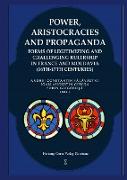- Start
- POWER, ARISTOCRACIES AND PROPAGANDA
POWER, ARISTOCRACIES AND PROPAGANDA
Angebote / Angebote:
The outcome of a scientific conference organized in November 2021, this volume aims to provide a picture of how the aristocratic political class of France and Moldavia sought to challenge monarchical power and how the latter tried to reassert itself in face of this turbulent nobility, in the context of the endemic civil wars that plagued both countries during the chosen period. For this purpose, this volume tries to analyze both the ideological issues involved in these endemic struggles, as they appear in the propaganda of the period, and the practical aspects and consequences (political intrigues or military developments) of the conflictual relationship between the rulers of these countries and their discontented nobles. Divided into two sections, one dedicated to the case of France during the Wars of Religion, the other to Moldavia from the beginning of the sixteenth century to the end of the seventeenth century, this volume is also the result of a collaborative work between French and Romanian academics, who thus tried to bridge what seemed like a (large) geographical gap in order to benefit from different perspectives and thus gain a better insight into different (but maybe not so different) models of early modern European political cultures. In the end, despite the distance between them, in early modern France and Moldavia, to effectively challenge the authority of the king or prince, one had to take up arms: and the nobility, who imagined itself first and foremost as a military order, did exactly that. But there is more to this clash between ruler and rebels than a mere contest of military strength. Despite the apparent political and cultural differences between early modern France and Moldavia, there is one common feature that influenced the behaviour of the rebels in both countries: the need for a justification of the revolt. Since the rebels operated in a political environment where the king (or the prince) was the source of all legitimacy (in particular, the nobility was beholden to the traditional aristocratic ethos of loyalty towards the ruler) and this common mentality of politics shaped the actions of the ruling class, they had to persuade the public opinion (domestic or international) of the righteousness of their cause.
Folgt in ca. 10 Arbeitstagen

